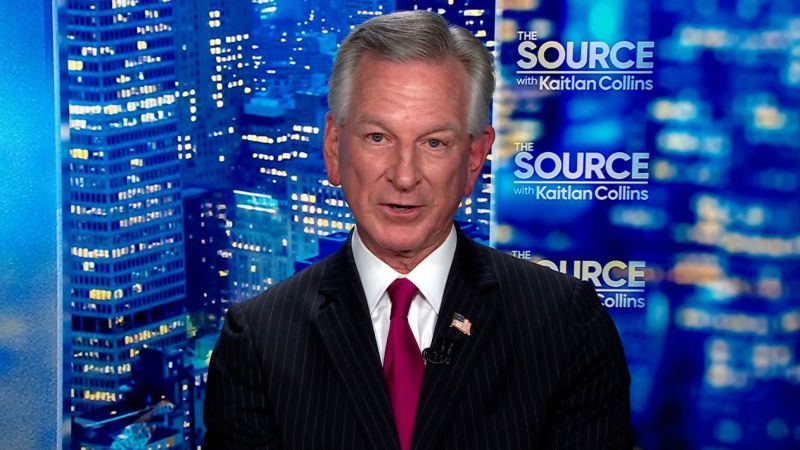

A version of this story appears in CNN’s What Matters newsletter. To get it in your inbox, sign up for free here.
CNN
—
Sen. Tommy Tuberville, the Alabama Republican, does not consider himself to be a racist – which is an important place to start from since you’re about to hear quite a bit about his apparent defense of White nationalists, who he suggested Monday might not be racist either.
By Tuesday, Tuberville had backtracked, telling reporters on Capitol Hill – but off camera – that, indeed, “White nationalists are racists.”
His Tuesday cleanup notwithstanding, it’s worth taking a closer look at Tuberville’s full exchange with CNN’s Kaitlan Collins on her show, “The Source,” because it is a window into the thoughts and motivations of a US senator who is currently holding up promotions at the Pentagon for hundreds of senior leaders.
That separate, solo obstruction has left the US Marine Corps without a Senate-approved commandant for the first time in more than a century.
The Monday CNN interview was an incredible exchange, which began as an opportunity for Tuberville to explain his Pentagon obstruction as a protest of Biden administration abortion policy. More on that below.
In the White nationalism portion of the interview, Tuberville was being asked to explain comments he made to an Alabama radio station back in May, when he was asked if he thought White nationalists should be allowed to serve in the military.
“Well, they call them that,” Tuberville said back then of people who oppose White nationalists. “I call them Americans.”
RELATED: Who are White nationalists and what do they want?
Factually, it’s true that there are Americans who are White nationalists. It’s also true that there have been warnings from the Pentagon about White nationalists serving in the military.
Politically, it caused a moderate kerfuffle in May when Tuberville seemed to be trying to stand up for White nationalists in the military, although his office later said he was misunderstood.
His comments to Collins, when she asked him to explain on Monday, went so much further.
“First of all, I’m totally against any type of racism, OK?” he said, offering up his 40-year football coaching resume when he was “around more minorities than anybody up here on this Hill,” as evidence.
His complaint, he said, is that after the January 6, 2021, insurrection, he did not like that Democrats in general and Senate Majority Leader Chuck Schumer in particular were referring to people as racist, nationalist and White nationalist.
We should note here that there were multiple photos from inside the Capitol on January 6 that showed people displaying Confederate flags and that people with ties to extremist groups like the Proud Boys and the Oath Keepers have been found guilty of seditious conspiracy against the government.
“White nationalists is just another word that they want to use, other than racism,” Tuberville told Collins.
Below are more portions of the transcript, which you can read in full here.
TUBERVILLE: I’m totally against anything to do with racism. But the thing about being a White nationalist is just a cover word, for the Democrats, now, where they can use it, to try to make people mad across the country. Identity politics. I’m totally against that. But I’m for the American people. I’m for military. I’m for Christian, conservatives, Democrats, whoever wants to be in the military, to fight for this country, to protect this country. That’s what it’s all about.
And the interview went on:
COLLINS: But just to be clear, you agree that White nationalists should not be serving in the US military? Is that what you’re saying?
TUBERVILLE: If people think that a White nationalist is racist? I agree with that. I would agree they shouldn’t.
COLLINS: But a White nationalist is someone who believes that the White race is superior to other races.
TUBERVILLE: Well, that’s some people’s opinion. And I don’t think. I mean a lot –
COLLINS: It’s not opinion.
TUBERVILLE: Pardon?
COLLINS: What’s your opinion?
TUBERVILLE: My opinion of a White nationalist, if somebody wants to call them a White nationalist, to me, is an American. It’s an American. Now, if that White nationalist is a racist, I’m totally against anything that they want to do, because I am 110% against racism.
But I want somebody that’s in our military, that’s strong, that believes in this country, that’s an American that will fight along anybody, whether it’s a man, or woman, Black or White, red. It doesn’t make any difference.
And so, I’m totally against identity politics. I think it’s ruining this country. And I think that Democrats ought to be ashamed for how they’re doing this, because it’s dividing this country, and it’s making this country weaker every day.
COLLINS: But that’s not identity politics. You said a White nationalist is an American.
TUBERVILLE: It is identity politics.
COLLINS: You said a White nationalist is an American. But a White nationalist is someone who believes horrific things. You don’t – do you really think that’s someone who should be serving in the military?
TUBERVILLE: Well, that’s just a name that it’s been given.
COLLINS: It’s not. It’s a real –
TUBERVILLE: I mean, listen?
COLLINS: It’s a real definition. There’s real concerns about extremism.
TUBERVILLE: So, if you’re going to do away with most White people in this country, out of the military, we got huge problems.
Let’s pause here. Tuberville seems to be suggesting that all White people could be removed from the military if White nationalists were removed from the military.
In the most generous possible viewing of this interview for Tuberville, this comment perhaps could be read as suggesting he does not understand what a White nationalist is – essentially a euphemism for a version of White supremacy.
It is, perhaps, possible that this man is rather separating the word “White” from the word “nationalist.” Only then – if you did not understand that combining the two terms creates an inherently racist outlook – could you argue that a White nationalist is not a racist and that removing White nationalists from the military would remove all White people from the military.
However, Tuberville is not just any 68-year-old former football coach. He’s the senator elected by the people of Alabama.
Tuberville has previously made comments that required some explanation, such as when he seemed to not know the three branches of US government. He has also made racially charged statements, such as when he declared, incorrectly, at a political rally for former President Donald Trump that Democrats want reparations for the descendants of slaves in order to give money to criminals.
Collins tried to explain the difference between White and White nationalism during their exchange.
COLLINS: It’s not people who are White. It’s White nationalists.
TUBERVILLE: That have a few probably different beliefs.
COLLINS: You see the distinction, right?
TUBERVILLE: That have different beliefs. Now, if racism is one of those beliefs? I’m totally against it. I am totally against racism.
COLLINS: But that is a White –
TUBERVILLE: But there’s a lot of people that believe in different things.
COLLINS: A White nationalist is racist, Senator.
TUBERVILLE: Well, that’s your opinion. That’s your opinion. But if it’s racism?
COLLINS: It’s not an opinion.
TUBERVILLE: If it’s racism? I’m totally against it. I am totally against any type of race – any type of racism. I don’t care what it’s in.
Tuberville wasn’t just questioning whether White nationalists are racist. He’s also embarked on a one-man effort to obstruct promotions at the Pentagon.
His gripe is that the Biden administration, now that access to abortion is limited in much of the country, wants to pay for time off and travel for service members who need to travel to obtain one.
This is not a position where Tuberville is leading a group. He’s doing it on his own, against the wishes of Republican leaders, and he’s not backing down.
“I’m a senator. I can hold any confirmation I want,” he told Collins, complaining that neither the White House nor Pentagon has reached out to debate the policy with him.
He fears it will lead to a rash of new abortions, and while he admits that the abortion care is not taxpayer funded under the Pentagon’s policy, he feels supporting the service members stationed in states with abortion restrictions will lead to a rash of abortions in the military.
“I’m not trying to be hardheaded, about this,” Tuberville told Collins. “I just want some conversation, and get a reasonable explanation, of why we’re doing this.”
Why, exactly, should one senator get to hold up nominations in this way?
It’s not in the Constitution or in law, but rather an informal custom of “holds” in the Senate that’s only been around since the 1950s.
Democrats, it should be noted, are more than happy to complain about Tuberville, but they haven’t exactly moved to end the practices by which he’s stopped things up. Perhaps that’s because it has elevated Tuberville to be a voice of the GOP and placed other Republicans in the position of talking about obstruction and White nationalism rather than things they’d rather be talking about.
